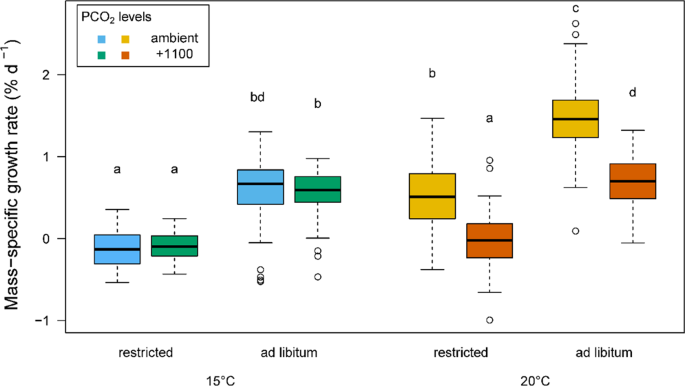
Breitburg, D. L. et al. Understanding Effects of Multiple Stressors: Ideas and Challenges. in Successes, Limitations, and Frontiers in Ecosystem Science (eds. Pace, M. L. & Groffman, P. M.) 416–431, https://doi.org/10.1007/978-1-4612-1724-4_17, (Springer New York, 1998)
Frost, T. M. et al. Multiple stresses from a single agent: Diverse responses to the experimental acidification of Little Rock Lake, Wisconsin. Limnol. Oceanogr. 44, 11 (1999).
Schindler, D. W. The Cumulative Effects of Climate Warming and Other Human Stresses on Canadian Freshwaters in the New Millennium. (2001) Available at: https://www.researchgate.net/publication/255649878_The_Cumulative_Effects_of_Climate_Warming_and_Other_Human_Stresses_on_Canadian_Freshwaters_in_the_New_Millennium. (Accessed: 22nd August 2019).
Hodgson, E. E. & Halpern, B. S. Investigating cumulative effects across ecological scales: Cumulative Impacts Across Scales. Conserv. Biol. https://doi.org/10.1111/cobi.13125 (2018).
Vinebrooke, R. D. et al. Impacts of multiple stressors on biodiversity and ecosystem functioning: the role of species co-tolerance. Oikos 104, 451–457 (2004).
Meehl, G. A. et al. Global climate projections. (2007).
Climate Change 2014: Synthesis Report of the IPCC Fifth Assessment Report (AR5) | weADAPT. Available at: https://www.weadapt.org/knowledgebase/national-adaptation-planning/climate-change-2014-synthesis-report. (Accessed: 27th February 2019).
Doney, S. et al. Climate Change Impacts on Marine Ecosystems. vol. 4 (2012).
Harvey, B. P., Gwynn-Jones, D. & Moore, P. J. Meta-analysis reveals complex marine biological responses to the interactive effects of ocean acidification and warming. Ecol. Evol. 3, 1016–1030 (2013).
Lefevre, S. Are global warming and ocean acidification conspiring against marine ectotherms? A meta-analysis of the respiratory effects of elevated temperature, high CO2 and their interaction. Conserv. Physiol. 4, cow009 (2016).
Kroeker, K. J. et al. Impacts of ocean acidification on marine organisms: quantifying sensitivities and interaction with warming. Glob. Change Biol. 19, 1884–1896 (2013).
Pope, E. C. et al. European sea bass, Dicentrarchus labrax, in a changing ocean. Biogeosciences 11, 2519–2530 (2014).
Pimentel, M. S. et al. Defective skeletogenesis and oversized otoliths in fish early stages in a changing ocean. J. Exp. Biol. 217, 2062–2070 (2014).
McCulloch, M., Falter, J., Trotter, J. & Montagna, P. Coral resilience to ocean acidification and global warming through pH up-regulation. Nat. Clim. Change 2, 623–627 (2012).
Cohen, A. & Michael, H. Why Corals Care About Ocean Acidification: Uncovering the Mechanism. Oceanography 22 (2009).
Hettinger, A. et al. The influence of food supply on the response of Olympia oyster larvae to ocean acidification. Biogeosciences 10, 6629–6638 (2013).
Thomsen, J., Casties, I., Pansch, C., Körtzinger, A. & Melzner, F. Food availability outweighs ocean acidification effects in juvenile Mytilus edulis: laboratory and field experiments. Glob. Change Biol. 19, 1017–1027 (2013).
Towle, E. K., Enochs, I. C. & Langdon, C. Threatened Caribbean Coral Is Able to Mitigate the Adverse Effects of Ocean Acidification on Calcification by Increasing Feeding Rate. PLoS ONE 10, e0123394 (2015).
Gobler, C. J., Merlo, L. R., Morrell, B. K. & Griffith, A. W. Temperature, Acidification, and Food Supply Interact to Negatively Affect the Growth and Survival of the Forage Fish, Menidia beryllina (Inland Silverside), and Cyprinodon variegatus (Sheepshead Minnow). Front. Mar. Sci. 5 (2018).
Hurst, T. P., Laurel, B. J., Hanneman, E., Haines, S. A. & Ottmar, M. L. Elevated CO2 does not exacerbate nutritional stress in larvae of a Pacific flatfish. Fish. Oceanogr 26, 336–349 (2017).
Sswat, M. et al. Food web changes under ocean acidification promote herring larvae survival. Nat. Ecol. Evol. 2 (2018).
Stiasny, M. H. et al. Divergent responses of Atlantic cod to ocean acidification and food limitation. Glob. Change Biol. 25, 839–849 (2019).
Cahu, C. L. & Infante, J. L. Z. Early weaning of sea bass (Dicentrarchus labrax) larvae with a compound diet: Effect on digestive enzymes. Comp. Biochem. Physiol. A Physiol. 109, 213–222 (1994).
Zambonino-Infante, J. L. et al. An early life hypoxia event has a long-term impact on protein digestion and growth in juvenile European sea bass. J. Exp. Biol. 220, 1846–1851 (2017).
Stumpp, M. et al. Digestion in sea urchin larvae impaired under ocean acidification. Nat. Clim. Change 3, 1044–1049 (2013).
Strobel, A. et al. Metabolic shifts in the Antarctic fish Notothenia rossii in response to rising temperature and P CO2. Front. Zool. 9, 28 (2012).
Gunderson, A. R., Armstrong, E. J. & Stillman, J. H. Multiple Stressors in a Changing World: The Need for an Improved Perspective on Physiological Responses to the Dynamic Marine Environment. Annu. Rev. Mar. Sci 8, 357–378 (2016).
Melzner, F. et al. Food Supply and Seawater pCO2 Impact Calcification and Internal Shell Dissolution in the Blue Mussel Mytilus edulis. PLoS ONE 6, e24223 (2011).
Ramajo, L. et al. Food supply confers calcifiers resistance to ocean acidification. Sci. Rep. 6 (2016).
Lesniowski, T. J. et al. Effects of food and CO2 on growth dynamics of polyps of two scyphozoan species (Cyanea capillata and Chrysaora hysoscella). Mar. Biol. 162, 1371–1382 (2015).
Cattano, C., Claudet, J., Domenici, P. & Milazzo, M. Living in a high CO2 world: a global meta-analysis shows multiple trait-mediated fish responses to ocean acidification. Ecol. Monogr. 88, 320–335 (2018).
Foss, A. et al. Effects of water reuse and stocking density on water quality, blood physiology and growth rate of juvenile cod (Gadus morhua). Aquaculture 256, 255–263 (2006).
Pimentel, M. S. et al. Foraging behaviour, swimming performance and malformations of early stages of commercially important fishes under ocean acidification and warming. Clim. Change 137, 495–509 (2016).
Hatziathanasiou, A. et al. Survival, growth and feeding in early life stages of European sea bass (Dicentrarchus labrax) intensively cultured under different stocking densities. Aquaculture 205, 89–102 (2002).
Benhaïm, D. et al. Effect of size grading on sea bass (Dicentrarchus labrax) juvenile self-feeding behaviour, social structure and culture performance. Aquat. Living Resour. 24, 391–402 (2011).
Gardeur, J.-N., Lemarié, G., Coves, D. & Boujard, T. Typology of individual growth in sea bass (Dicentrarchus labrax). Aquat. Living Resour 14, 223–231 (2001).
Claireaux, G. & Lagardère, J.-P. Influence of temperature, oxygen and salinity on the metabolism of the European sea bass. J. Sea Res. 42, 157–168 (1999).
Munday, P. L. Transgenerational acclimation of fishes to climate change and ocean acidification. F1000Prime Rep. 6 (2014).
Murray, C., Malvezzi, A. J., Gobler, C. & Baumann, H. Offspring sensitivity to ocean acidification changes seasonally in a coastal marine fish. Mar. Ecol. Prog. Ser. 504, 1–11 (2014).
Jarrold, M. D. & Munday, P. L. Diel CO2 cycles and parental effects have similar benefits to growth of a coral reef fish under ocean acidification. Biol. Lett 15, 20180724 (2019).
Griffith, A. W. & Gobler, C. J. Transgenerational exposure of North Atlantic bivalves to ocean acidification renders offspring more vulnerable to low pH and additional stressors. Sci. Rep 7, 11394 (2017).
Nowicki, J. P., Miller, G. M. & Munday, P. L. Interactive effects of elevated temperature and CO2 on foraging behavior of juvenile coral reef fish. J. Exp. Mar. Biol. Ecol. 412, 46–51 (2012).
Vargas, C. A. et al. CO2-driven ocean acidification reduces larval feeding efficiency and changes food selectivity in the mollusk Concholepas concholepas. J. Plankton Res. 35, 1059–1068 (2013).
Buentello, J. A., Gatlin, D. M. & Neill, W. H. Effects of water temperature and dissolved oxygen on daily feed consumption, feed utilization and growth of channel catfish (Ictalurus punctatus). Aquaculture 182, 339–352 (2000).
Handeland, S. O., Imsland, A. K. & Stefansson, S. O. The effect of temperature and fish size on growth, feed intake, food conversion efficiency and stomach evacuation rate of Atlantic salmon post-smolts. Aquaculture 283, 36–42 (2008).
Imsland, A. K., Foss, A., Sparboe, L. O. & Sigurdsson, S. The effect of temperature and fish size on growth and feed efficiency ratio of juvenile spotted wolffish Anarhichas minor. J. Fish Biol. 68, 1107–1122 (2006).
Zoccarato, I. et al. Differences in performance, flesh composition and water output quality in relation to density and feeding levels in rainbow trout, Oncorhynchus mykiss (Walbaum), farming. Aquac. Res. 25, 639–647 (1994).
Deguara, S., Jauncey, K. & Agius, C. Enzyme activities and pH variations in the digestive tract of gilthead sea bream. J. Fish Biol. 62, 1033–1043 (2003).
Getachew, T. Stomach pH, feeding rhythm and ingestion rate in Oreochromis niloticus L. (Pisces: Cichlidae) in Lake Awasa, Ethiopia. Hydrobiologia 174, 43–48 (1989).
Kuz’mina, V. V. Influence of age on digestive enzyme activity in some freshwater teleosts. Aquaculture 148, 25–37 (1996).
Bucking, C. & Wood, C. M. The effect of postprandial changes in pH along the gastrointestinal tract on the distribution of ions between the solid and fluid phases of chyme in rainbow trout. Aquac. Nutr 15, 282–296 (2009).
Solovyev, M. & Gisbert, E. Influence of time, storage temperature and freeze/thaw cycles on the activity of digestive enzymes from gilthead sea bream (Sparus aurata). Fish Physiol. Biochem. 42, 1383–1394 (2016).
Nikolopoulou, D. et al. Patterns of gastric evacuation, digesta characteristics and pH changes along the gastrointestinal tract of gilthead sea bream (Sparus aurata L.) and European sea bass (Dicentrarchus labrax L.). Comp. Biochem. Physiol. A. Mol. Integr. Physiol. 158, 406–414 (2011).
Yúfera, M., Moyano, F. J., Astola, A., Pousão-Ferreira, P. & Martínez-Rodríguez, G. Acidic Digestion in a Teleost: Postprandial and Circadian Pattern of Gastric pH, Pepsin Activity, and Pepsinogen and Proton Pump mRNAs Expression. PLoS ONE 7, e33687 (2012).
Jobling, M. Mathematical models of gastric emptying and the estimation of daily rates of food consumption for fish. J. Fish Biol. 19, 245–257 (1981).
Tirsgaard, B., Moran, D. & Steffensen, J. F. Prolonged SDA and reduced digestive efficiency under elevated CO2 may explain reduced growth in Atlantic cod (Gadus morhua). Aquat. Toxicol. Amst. Neth. 158, 171–180 (2015).
Taylor, J. R. & Grosell, M. Feeding and osmoregulation: dual function of the marine teleost intestine. J. Exp. Biol. 209, 2939–2951 (2006).
Dao, M. L., Shao, R., Risley, J. & Good, R. A. Influence of chronic energy intake restriction on intestinal alkaline phosphatase in C3H/Bi mice and autoimmuneprone MRL/lpr,lpr mice. J. Nutr 119, 2017–2022 (1989).
Cyrino, J. E. P., Bureau, D. P. & Kapoor, B. G. Feeding and digestive functions of fishes. (Enfield, N.H.: Science Publishers, 2008).
Infante, J. L. Z., Cahu, C. L., Pères, A., Quazuguel, P. & Le Gall, M. M. Sea bass (Dicentrarchus labrax) larvae fed different Artemia rations: growth, pancreas enzymatic response and development of digestive functions. Aquaculture 139, 129–138 (1996).
Heuer, R. M., Esbaugh, A. J. & Grosell, M. Ocean acidification leads to counterproductive intestinal base loss in the gulf toadfish (Opsanus beta). Physiol. Biochem. Zool. 85, 450–459 (2012).
Akiba, Y., Mizumori, M., Guth, P. H., Engel, E. & Kaunitz, J. D. Duodenal brush border intestinal alkaline phosphatase activity affects bicarbonate secretion in rats. Am. J. Physiol. Gastrointest. Liver Physiol. 293, G1223–1233 (2007).
Gregório, S. F., Ruiz-Jarabo, I., Carvalho, E. M. & Fuentes, J. Increased intestinal carbonate precipitate abundance in the sea bream (Sparus aurata L.) in response to ocean acidification. PLoS ONE 14, e0218473 (2019).
Fraisse, M., Woo, N. Y. S., Noaillac-Depeyre, J. & Murat, J. C. Distribution pattern of digestive enzyme activities in the intestine of the catfish (Ameiurus nebulosus L.) and of the carp (Cyprinus carpio L.). Comp. Biochem. Physiol. A Physiol. 70, 443–446 (1981).
Lallès, J.-P. Intestinal alkaline phosphatase: multiple biological roles in maintenance of intestinal homeostasis and modulation by diet. Nutr. Rev 68, 323–332 (2010).
Rosa, R. et al. Deficit in digestive capabilities of bamboo shark early stages under climate change. Mar. Biol. 163, 60 (2016).
Pimentel, M. S. et al. Oxidative Stress and Digestive Enzyme Activity of Flatfish Larvae in a Changing Ocean. PLoS ONE 10 (2015).
Lemieux, H., Blier, P. & Dutil, J.-D. Do digestive enzymes set a physiological limit on growth rate and food conversion efficiency in the Atlantic cod (Gadus morhua)? Fish Physiol. Biochem. 20, 293–303 (1999).
Rungruangsak-Torrissen, K., Moss, R., Andresen, L. H., Berg, A. & Waagbø, R. Different expressions of trypsin and chymotrypsin in relation to growth in Atlantic salmon (Salmo salar L.). Fish Physiol. Biochem. 32, 7–23 (2006).
Lamarre, S. G. et al. Interrelationship Between Contractility, Protein Synthesis and Metabolism in Mantle of Juvenile Cuttlefish (Sepia officinalis). Front. Physiol. 10 (2019).
Frommel, A. et al. Severe tissue damage in Atlantic cod larvae under increasing ocean acidification. Nat. Clim. Change 2, 42–46 (2012).
Pickett, G. D. & Pawson, M. G. Sea Bass: Biology. (Springer Science & Business Media, 1994).
Lonthair, J., Ern, R. & Esbaugh, A. J. The early life stages of an estuarine fish, the red drum (Sciaenops ocellatus), are tolerant to high pCO2. ICES J. Mar. Sci. 74, 1042–1050 (2017).
Wallace, R. B., Baumann, H., Grear, J. S., Aller, R. C. & Gobler, C. J. Coastal ocean acidification: The other eutrophication problem. Estuar. Coast. Shelf Sci. 148, 1–13 (2014).
Melzner, F. et al. Future ocean acidification will be amplified by hypoxia in coastal habitats. Mar. Biol. 160, 1875–1888 (2013).
Frankignoulle, M. et al. Carbon Dioxide Emission from European Estuaries. Science 282, 434–436 (1998).
Chauvaud, L., Donval, A., Thouzeau, G., Paulet, Y.-M. & Nézan, E. Variations in food intake of Pecten maximus (L.) from the Bay of Brest (France): Influence of environmental factors and phytoplankton species composition. Comptes Rendus L39Académie Sci. – Ser. III – Sci. Vie 324, 743–755 (2001).
de Pontual, H. et al. New insights into behavioural ecology of European seabass off the West Coast of France: implications at local and population scales. ICES J. Mar. Sci 76, 501–515 (2019).
Climate Change 2007: The Physical Science Basis — IPCC (AR4).
Vinagre, C., Madeira, D., Narciso, L., Cabral, H. & Diniz, M. Impact of climate change on coastal versus estuarine nursery areas: cellular and whole-animal indicators in juvenile seabass Dicentrarchus labrax. Mar. Ecol. Prog. Ser. 464, 237–243 (2012).
Anastasiadi, D., Díaz, N. & Piferrer, F. Small ocean temperature increases elicit stage-dependent changes in DNA methylation and gene expression in a fish, the European sea bass. Sci. Rep 7, 12401 (2017).
Anderson, J. T. A Review of Size Dependent Survival During Pre-Recruit Stages of Fishes in Relation to Recruitment. 8, 12 (1988).
Strickland, J. D. H. & Parsons, T. R. A practical handbook of seawater analysis . (Fisheries Research Board of Canada, 1972).
Lewis, E., Wallace, D., & Allison, L. J. Program developed for CO {sub 2} system calculations (No. ORNL/CDIAC-105). Brookhaven National Lab., Dept. of Applied Science, Upton, NY (United States); Oak Ridge National Lab., Carbon Dioxide Information Analysis Center, TN (United States). – Google Search. https://www.google.com/search?client=firefox-bdamp;channel=crowamp;q=69.%09Lewis%2C+E.%2C+Wallace%2C+D.%2C+%26+Allison%2C+L.+J.+%281998%29.+Program+developed+for+CO+%7Bsub+2%7D+system+calculations+%28No.+105%29.+Brookhaven+National+Lab.%2C+Dept.+of+Applied+Science%2C+Upton%2C+NY+%28United+States%29%3B+Oak+Ridge+National+Lab.%2C+Carbon+Dioxide+Information+Analysis+ (1998).
Mehrbach, C., Culberson, C. H., Hawley, J. E. & Pytkowicz, R. M. Measurement of the Apparent Dissociation Constants of Carbonic Acid in Seawater at Atmospheric Pressure1. Limnol. Oceanogr. 18, 897–907 (1973).
Dickson, A. G. & Millero, F. J. A comparison of the equilibrium constants for the dissociation of carbonic acid in seawater media. Deep Sea Res. Part Oceanogr. Res. Pap 34, 1733–1743 (1987).
Gourtay, C. et al. Will global warming affect the functional need for essential fatty acids in juvenile sea bass (Dicentrarchus labrax)? A first overview of the consequences of lower availability of nutritional fatty acids on growth performance. Mar. Biol. 165 (2018).
Crane, R. K., Boge, G. & Rigal, A. Isolation of brush border membranes in vesicular form from the intestinal spiral valve of the small dogfish (Scyliorhinus canicula). Biochim. Biophys. Acta 554, 264–267 (1979).
Holm, H., Hanssen, L. E., Krogdahl, A. & Florholmen, J. High and low inhibitor soybean meals affect human duodenal proteinase activity differently: in vivo comparison with bovine serum albumin. J. Nutr 118, 515–520 (1988).
Métais, P. & Bieth, J. [Determination of alpha-amylase by a microtechnic]. Ann. Biol. Clin. (Paris) 26, 133–142 (1968).
Bessey, O. A., Lowry, O. H. & Brock, M. J. A Method for the Rapid Determination of Alkaline Phosphatase with Five Cubic Millimeters of Serum. J. Biol. Chem. 164, 321–329 (1946).
Maroux, S., Louvard, D. & Barath, J. The aminopeptidase from hog intestinal brush border. Biochim. Biophys. Acta BBA – Enzymol 321, 282–295 (1973).
Bradford, M. M. A rapid and sensitive method for the quantitation of microgram quantities of protein utilizing the principle of protein-dye binding. Anal. Biochem. 72, 248–254 (1976).
Cominassi, L. Combined effects of ocean acidification and warming on a large pelagic fish, the European sea bass (Dicentrarchus labrax). PhD thesis, University of Hamburg. 2019. https://d-nb.info/1200548426/34.
Source: Ecology - nature.com



